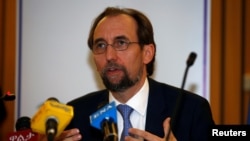The U.N.'s human rights chief urged Uzbekistan on Thursday to avoid "repressive policies" in its fight against Islamist radicalization, a growing threat throughout Central Asia, while welcoming a rapprochement with Tashkent.
Zeid Ra'ad Al Hussein, the first United Nations High Commissioner for Human Rights to visit Uzbekistan since the post was created in 1993, said the former Soviet republic had agreed to work with his office after previously refusing to do so.
Commenting on President Shavkat Mirziyoyev's reform plans, which include an overhaul of the judicial system and measures to tackle religious extremism, Hussein said it was crucial to balance the latter with ensuring individual rights.
"As in other countries, I have emphasized that the answer to the risk of radicalization is not simply heavy-handed security measures and repressive policies which breed resentment and frustration, thereby making it easier for extremists to recruit new supporters," he said.
President Islam Karimov, who died in September after 27 years in power, had been widely criticized for his government's human rights violations, and Tashkent's ties with the West hit their lowest point after troops violently suppressed unrest in the city of Andijan in 2005.
Hussein, describing the Andijan events as "terrible," told a briefing: "While it is important to look forward, it also important to come to terms with past events and ensure that victims are not forgotten and their grievances are addressed."
Hussein said he had had an hour-and-a-half meeting with Mirziyoyev, "in which we found much common ground and reached agreements on a number of concrete steps."
Uzbekistan found itself in a global security spotlight after an Uzbek man living in Sweden was identified as the main suspect behind the deadly truck attack in Stockholm last month. Hundreds of Uzbeks are also believed to have joined the Islamic State militant group based in Syria and Iraq.





